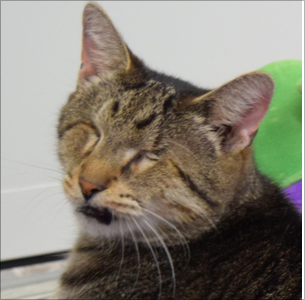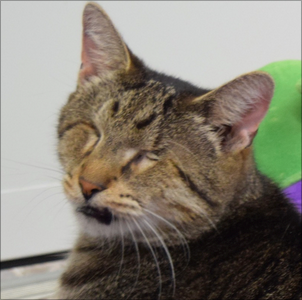My incredibly curious cat Merritt (she’s a busy-body calico) is sniffing something again, which
isn’t surprising. What is surprising is when she sniffs an object and looks up with her lips curled
just slightly back. At first, I thought it was simply a look of concern or surprise over what she
had just smelled. But that “cat stinky face” has a scientific name, flehmen, and cats aren’t the
only ones who do it. So, what is a cat flehmen response and why does it happen? Let’s take a
look.
What does a cat flehmen response look like?
I’d best describe the cat flehmen response as a look of utter, lip-curling disgust / confusion /
concern that elicits some true laugh-out-loud reactions from the cat parents that catch their kitties
doing it (see Merritt’s face above during her — supervised and ribbon-less! — prance in our
discarded holiday gift wrap). “The flehmen response looks like a cat frozen with her mouth
open,” Dr. Sasha Gibbons of Just Cats Veterinary Hospital in Stamford, Connecticut, explains.
“Sometimes, cats will roll their lips back over the teeth as well, which can resemble a sneer.”
What is a cat flehmen response?
My cats have some strong opinions and “pooh pooh” at everything from house guests to new
toys. But, the cat stinky face isn’t necessarily a snooty sneer — it’s actually way more scientific
than that. “The flehmen response is a type of sniffing, but instead of using their nostrils, cats
inhale the air through their open mouths,” Dr. Gibbons says.
Anthrozoologist John Bradshaw tells Slate that the flehmen response opens up two small ducts,
also known as the nasopalatine canals, on the roof of an animal’s mouth behind the incisors.
Those ducts then go through the roof of the mouth and join up with the vomeronasal organ (a.k.a.
the Jacobson’s organ), which according to Bradshaw, functions as an auxiliary olfactory bulb of
sorts. Slate also reports that some scientists believe the flehmen response does something that’s
between the sense of smell and taste (so cats, sort of DO have a sixth sense!). The ducts contain
saliva, meaning that whatever goes in must be voluntarily brought up to the vomeronasal organ.
In other words, flehmen isn’t an automatic way to take in smells, as one does through breathing.
The article goes on to explain that cats actually have better vomeronasal organs than dogs. An
average house cat has 30 different receptors in that organ, whereas a hound dog has a measly
nine.
Why does a cat flehmen response happen?
“Cats use the flehmen response to detect chemical stimuli, such as pheromones, that are present
in urine and feces, or areas that cats have marked with scent glands,” Dr. Gibbons says.
But here’s an interesting fact — male cats usually flehmen more than female cats! “Male cats use
the flehmen response in relation to mating,” Dr. Gibbons explains. “Scents can help indicate
compatibility and if timing is right.”
Of course, there are exceptions to the cat flehmen response, as with my cats. I catch Merritt, my
female kitty, displaying a flehmen response to something about once a day. I’ve only seen my
male cat, Gabby, flehmen a handful of times in the five years we’ve had him.
Are cats the only ones who display a flehmen response?
Nope! “Along with domestic cats, large cats such as lions and tigers, also use the flehmen
response,” Dr. Gibbons tells us. “Outside of the cat family, horses, giraffes, buffalos, goats and
llamas have also been seen demonstrating the flehmen response.” Slate reports that humans used
to have the vomeronasal organs necessary for a flehmen response — but they got phased out in
the evolutionary process. Bummer!
Should you ever be concerned about a cat flehmen response?
Thankfully, the answer is a definite no. “As funny as it may look, there is no harm to a cat
exhibiting a flehmen response,” Dr. Gibbons advises. So, enjoy those cat stinky faces (and take
some photos — there are not enough good #flehmen pics featuring cats on Instagram!). A cat
flehmen response is normal and you have nothing to worry about!
Tell us: Have you ever witnessed a cat flehmen response? Do you have any nicknames for it?
What do you think it looks like?
Thumbnail: Photography by fotostok_pdv/Thinkstock.
This piece was originally published in 2018.
About the author
Cait Rohan Kelly is a digital writer, editor and marketer with over a decade of experience
working with everything from sports stars to different types of cheese. She is currently the
Digital Content Marketing Manager for Catster and Dogster. Cait is a lifelong animal lover and
cat lady. She lives in Connecticut with her husband (a self-professed cat dude), her son (his first
word will probably be one of her cats’ names) and her two rescue cats — Gabby, an orange
tabby and avid sleeper, and Merritt, a sassy calico.

Does your cat sneer at you - with the Elvis sneer? Despite the popular opinion
about how cats view the world and their humans, this expression might not be
a judgement from your cat after all!It could be an actual, physiological part of
your cat called the flehmen response. For the non-vets reading this, the flehmen
response is somewhere between smelling and tasting. Cats have two extra ducts,
called nasopalatine canals, in the back of their mouths. They actually open up
into the Jacobson's organ, which is an extra olfactory sensor for the cat,
allowing for a kind of smell/taste sense combo. This actually does give cats a
sort of sixth sense! (We know they have those!) When a cat really wants to go
deep into figuring out what's around it - in the wild this means what other cats
have come through and sprayed or left other scents around - it activates the
flehmen response with that distinctive disgusted look! When you see it, your
cat is delving way into whatever stimulus triggered it.Maybe not too surprising,
Does Your Cat Have an Elvis Sneer?
Turns out he’s not judging you!
male cats do this more often than female cats and it's a trait shared by their big-cat cousins. Believe it or not, humans back
along the evolutionary chain used to have a similar ability but it went away over time. So, the next time your cat looks at you
"that way," glance around and see what he's checking out!
This great article from Catster.com will tell you more!
What is a Cat Flehmen Response?
The cat flehmen response, a.k.a. the cat stinky face, may look silly or even concerning, but it's
actually highly scientific. Let's learn more!
Cait Rohan Kelly | May 14th 2019
Donate Now
Donate Monthly
Sponsor
Wishlist
Other ways to help
Ebay
Donate your car
Donate your birthday
CFC
Amazon Smile
Memorials - page 1
Memorials - page 2
Memorials - page 3
Memorials - page 4
Memorials - page 5
Memorials - page 6
Memorials - page 7
Memorials - page 8
Memorials - page 9
Memorials - page 10
Memorials - page 11
Memorials - page 12









Sections
Thank you to our sponsors!
Does Your Cat Have an Elvis Sneer?
Turns out he’s not judging you!
Does your cat sneer at you - with the Elvis sneer?
Despite the popular opinion about how cats view
the world and their humans, this expression might
not be a judgement from your cat after all! It could
be an actual, physiological part of your cat called
the flehmen response. For the non-vets reading
this, the flehmen response is somewhere between
smelling and tasting. Cats have two extra ducts,
called nasopalatine canals, in the back of their
mouths. They actually open up into the Jacobson's
organ, which is an extra olfactory sensor for the cat,
allowing for a kind of smell/taste sense combo.
This actually does give cats a sort of sixth sense!
(We know they have those!) When a cat really
wants to go deep into figuring out what's around it -
in the wild this means what other cats have come
through and sprayed or left other scents around -
it activates the flehmen response with that distinctive
disgusted look! When you see it, your cat is
delving way into whatever stimulus triggered it.
Maybe not too surprising, male cats do this more
often than female cats and it's a trait shared by
their big-cat cousins. Believe it or not, humans back
along the evolutionary chain used to have a similar
ability but it went away over time. So, the next time
your cat looks at you "that way," glance around
and see what he's checking out!

This great article from Catster.com will tell you more!
The cat flehmen response, a.k.a. the cat stinky face,
may look silly or even concerning, but it's
actually highly scientific. Let's learn more!
Cait Rohan Kelly | May 14th 2019
What is a Cat Flehmen Response?
My incredibly curious cat Merritt (she’s a busy-body
calico) is sniffing something again, which isn’t
surprising. What is surprising is when she sniffs
an object and looks up with her lips curled just
slightly back. At first, I thought it was simply a
look of concern or surprise over what she had just
smelled. But that “cat stinky face” has a scientific
name, flehmen, and cats aren’t the only ones who
do it. So, what is a cat flehmen response and why
does it happen? Let’s take a look.
What does a cat flehmen response look like?
I’d best describe the cat flehmen response as a look
of utter, lip-curling disgust / confusion / concern
that elicits some true laugh-out-loud reactions
from the cat parents that catch their kitties doing
it (see Merritt’s face above during her — supervised
and ribbon-less! — prance in our discarded holiday
gift wrap). “The flehmen response looks like a cat
frozen with her mouth open,” Dr. Sasha Gibbons
of Just Cats Veterinary Hospital in Stamford,
Connecticut, explains. “Sometimes, cats will roll
their lips back over the teeth as well, which can
resemble a sneer.”
What is a cat flehmen response?
My cats have some strong opinions and “pooh
pooh” at everything from house guests to new
toys. But, the cat stinky face isn’t necessarily a
snooty sneer — it’s actually way more scientific
than that. “The flehmen response is a type of
sniffing, but instead of using their nostrils, cats
inhale the air through their open mouths,” Dr.
Gibbons says.
Anthrozoologist John Bradshaw tells Slate that
the flehmen response opens up two small ducts,
also known as the nasopalatine canals, on the
roof of an animal’s mouth behind the incisors.
Those ducts then go through the roof of the mouth
and join up with the vomeronasal organ (a.k.a.
the Jacobson’s organ), which according to Bradshaw,
functions as an auxiliary olfactory bulb of sorts.
Slate also reports that some scientists believe the
flehmen response does something that’s between
the sense of smell and taste (so cats, sort of DO
have a sixth sense!). The ducts contain saliva,
meaning that whatever goes in must be voluntarily
brought up to the vomeronasal organ. In other
words, flehmen isn’t an automatic way to take in
smells, as one does through breathing.
The article goes on to explain that cats actually
have better vomeronasal organs than dogs. An
average house cat has 30 different receptors in
that organ, whereas a hound dog has a measly
nine.
Why does a cat flehmen response happen?
“Cats use the flehmen response to detect chemical
stimuli, such as pheromones, that are present
in urine and feces, or areas that cats have marked
with scent glands,” Dr. Gibbons says.
But here’s an interesting fact — male cats usually
flehmen more than female cats! “Male cats use
the flehmen response in relation to mating,”
Dr. Gibbons explains. “Scents can help indicate
compatibility and if timing is right.”
Of course, there are exceptions to the cat flehmen
response, as with my cats. I catch Merritt, my
female kitty, displaying a flehmen response to
something about once a day. I’ve only seen my
male cat, Gabby, flehmen a handful of times
in the five years we’ve had him.
Are cats the only ones who display a flehmen
response?
Nope! “Along with domestic cats, large cats such
as lions and tigers, also use the flehmen response,”
Dr. Gibbons tells us. “Outside of the cat family,
horses, giraffes, buffalos, goats and llamas have
also been seen demonstrating the flehmen
response.” Slate reports that humans used
to have the vomeronasal organs necessary for
a flehmen response — but they got phased out in
the evolutionary process. Bummer!
Should you ever be concerned about a cat flehmen
response?
Thankfully, the answer is a definite no. “As funny
as it may look, there is no harm to a cat exhibiting
a flehmen response,” Dr. Gibbons advises. So, enjoy
those cat stinky faces (and take
some photos — there are not enough good
#flehmen pics featuring cats on Instagram!). A cat
flehmen response is normal and you have nothing
to worry about!
Tell us: Have you ever witnessed a cat flehmen
response? Do you have any nicknames for it?
What do you think it looks like?
Thumbnail: Photography by fotostok_pdv/Thinkstock.
This piece was originally published in 2018.
About the author
Cait Rohan Kelly is a digital writer, editor and
marketer with over a decade of experience
working with everything from sports stars to
different types of cheese. She is currently the
Digital Content Marketing Manager for Catster
and Dogster. Cait is a lifelong animal lover and
cat lady. She lives in Connecticut with her husband
(a self-professed cat dude), her son (his first
word will probably be one of her cats’ names) and
her two rescue cats — Gabby, an orange
tabby and avid sleeper, and Merritt, a sassy calico.
























